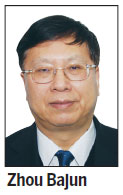HK braces for another political watershed
Updated: 2014-06-25 06:58
By Zhou Bajun(HK Edition)
|
|||||||
The white paper entitled "The Practice of the 'One Country, Two Systems' Policy in the Hong Kong Special Administrative Region (HKSAR)" was issued shortly before the illegal "Occupy Central" movement held a "popular vote" on June 20-29 and the annual July 1 demonstration organized by the opposition camp. However, the timing is no coincidence and these events show Hong Kong has reached a new watershed with regard to its political development.
Hong Kong experienced its first political watershed after becoming the HKSAR during the mass demonstrations of July 1, 2003.
Both these defining events demonstrated that a fundamental political conflict had developed in the HKSAR. The conflict is between two camps which follow different paths: one laid out in the nation's Constitution, the Basic Law and relevant decisions of the National People's Congress Standing Committee (NPCSC). The other labeled as "democracy" according to the one-sided interpretation of the Sino-British Joint Declaration (1984) by London.
Consequently, Hong Kong has become an arena for constant wrangling between two political camps - the patriots and the opposition.
However, until the illegal "Occupy Central" campaign was launched in early 2013, the opposition camp had refrained from outright advocacy of breaching Hong Kong's rule of law. Since then, however, the "Occupy" movement has initiated or joined a series of actions intended to weaken the rule of law. As a result the political situation in Hong Kong is deteriorating.

On Dec 26, 2013, members of a fringe group advocating "Hong Kong independence" deliberately broke the law by entering the Central Barracks of the People's Liberation Army Hong Kong Garrison - despite objections by the guards. They shouted slogans demanding the PLA leave Hong Kong. This is the first time since the handover in 1997 that a political group has encroached on a symbol of sovereign rule over Hong Kong.
Recently, the opposition has stormed the Legislative Council (LegCo) building on a number of occasions - supposedly to protest government plans for new towns in Kwu Tung and Fanling North. Certain protesters wanted the demonstration to be peaceful. But extreme radical members of opposition groups became violent and forced their way into the building. They used umbrellas, an electric wheelchair and some other objects to pry one of the building's side doors open. They then smashed the interior glass wall panels. LegCo security guards were overpowered by the mob. As a result police had to be called to stop them and police officers had to use pepper spray to subdue and arrest the most violent protesters. After watching these appalling scenes unfolding on TV few, if any, still believe "Occupy Central" can be peaceful.
The leaders of the "Occupy" campaign say they can block the streets of Central peacefully. But they have grossly underestimated the violent tendencies of some of their supporters. Observers have noted striking resemblances between some individuals involved in the LegCo break-ins and violent elements who participated in the "Sunflower Movement" in Taipei earlier this year.
Secretary for Security Lai Tung-kwok published an article in the local press of June 12, in which he warned that "Occupy Central" would turn violent. He doubted the "Occupy" organizers would be able to prevent radicals from hijacking the protests. "Once violent confrontation occurs, the situation may become irrevocable and things could get out of control," he wrote. As the official in charge of public security, Lai declared: "We will ensure that law enforcement officers act in accordance with the law and take robust action to uphold the rule of law and maintain public safety and public order."
The opposition camp is again trying to show a united front. Their rallying efforts include attacking the white paper, which fully and accurately clarified the State policy of "One Country, Two Systems". Pan-democrat leaders such as Martin Lee, Anson Chan, retired cardinal Joseph Zen and media mogul Jimmy Lai led the charge.
Faced with the opposition challenge, the "Love the Nation and Love Hong Kong" camp needs to unite more than ever. Some people and groups have abandoned the unrealistic expectation that the "moderate democrats" would accept a compromise on universal suffrage, based on the Basic Law and relevant decisions of the NPCSC. As a response to the white paper, the Democratic Party canceled a meeting with the head of the central government's liaison office, Zhang Xiaoming. That gesture should convince the few ranking officials of the SAR government and local politicians that "moderate democrats" have abandoned the idea of further talks with the central government.
Now, it's safe to assume no deals on universal suffrage in 2017 are possible. Instead, an impending political showdown looms over the city's political landscape.
Only by winning this battle can the patriots ensure HKSAR remains safely in the bosom of the motherland and continues to prosper.
The author is a veteran current affairs commentator.
(HK Edition 06/25/2014 page9)